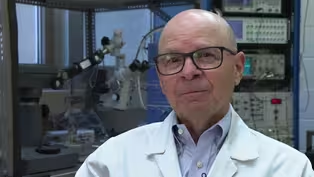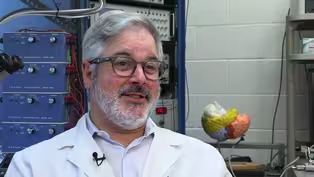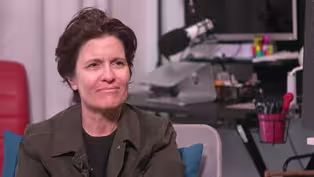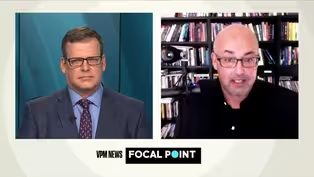VPM News Focal Point
Epilepsy treatments: Dr. Kenichiro Ono, VCU Health
Clip: Season 2 Episode 17 | 3m 17sVideo has Closed Captions
Neurologist Dr. Kenichiro Ono discusses deep brain stimulation and treating epilepsy.
Neurologist Dr. Kenichiro Ono talks about collaborating with researchers at Virginia Commonwealth University that explore deep brain stimulation as a treatment for seizures. He describes helping patients who live with epilepsy find better health care solutions. Dr. Ono’s interview is part of VPM News Focal Point’s coverage of computer-assisted medicine and artificial intelligence in health care.
Problems playing video? | Closed Captioning Feedback
Problems playing video? | Closed Captioning Feedback
VPM News Focal Point is a local public television program presented by VPM
The Estate of Mrs. Ann Lee Saunders Brown
VPM News Focal Point
Epilepsy treatments: Dr. Kenichiro Ono, VCU Health
Clip: Season 2 Episode 17 | 3m 17sVideo has Closed Captions
Neurologist Dr. Kenichiro Ono talks about collaborating with researchers at Virginia Commonwealth University that explore deep brain stimulation as a treatment for seizures. He describes helping patients who live with epilepsy find better health care solutions. Dr. Ono’s interview is part of VPM News Focal Point’s coverage of computer-assisted medicine and artificial intelligence in health care.
Problems playing video? | Closed Captioning Feedback
How to Watch VPM News Focal Point
VPM News Focal Point is available to stream on pbs.org and the free PBS App, available on iPhone, Apple TV, Android TV, Android smartphones, Amazon Fire TV, Amazon Fire Tablet, Roku, Samsung Smart TV, and Vizio.
Providing Support for PBS.org
Learn Moreabout PBS online sponsorshipKENICHIRO ONO: I'm a neurologist at the Department of Energy Affairs, Central Virginia Healthcare System and VCU Medical Center.
My line of work particularly involves folks who have seen other neurologists previously and may not have been prescribed, the combination of medications that helped treat their seizures, and they come to us seeking for more advanced therapies such as deep brain stimulation and responsive neurostimulation.
I don't personally conduct research, but Dr. Koch and I are collaborating to really better understand how the individual cells, on a microscopic level, conduct abnormal brain electricity patterns to cause seizures.
There's very much that we don't understand in how seizures start, but also really how they're interconnected with each other in terms of fancy computer network, you know?
The brain is a mysterious organ where brain electricity changes, occur in ways that we don't understand in fractions of a second.
It's only until recently that we've been able to use technology to better understand what exactly happens on that microscopic level.
If it's something that we understand better, that information might be used to either predict whether or not, a seizure is going to occur or maybe some more targeted therapy, surgical therapy, that could be even more precise than the methods that we have right now because medications certainly may not be the complete solution right now.
I'm usually the first person that a patient will see when they've reached a point where medications don't control their seizures.
I'll explain to them that, what my suspicions are about the situation, and we'll still try different medications, different medication combinations, but really, that's just to kind of buy us some time while we're doing the investigations to figure out whether surgery's right for these patients.
During that path, a patient may encounter multiple other neurologists, while they're in the hospital with us, and they'll also interact with our neuropsychologists to kind of really see how the epilepsy is not just impacting life when it's occurring.
You know, there's a lot of hidden consequences of the epilepsy, particularly related to thinking.
The areas of the brain that are impacted by seizures are still important and they're still doing work, but when they're interrupted by seizures, just day-to-day thinking that we take for granted, just doesn't work the way it should.
Along that path, patients may encounter three or four other doctors after seeing me until they finally meet the the neurological surgeon that has the right tools and the techniques to really make that impactful treatment happen.
AI and olfactory-implant systems: Dr. Richard Costanzo, VCU
Video has Closed Captions
Clip: S2 Ep17 | 7m 33s | Dr. Richard Costanzo discusses deep brain stimulation research about the sense of smell. (7m 33s)
AI, implants & smell: Dr. Daniel Coelho, VCU Health
Video has Closed Captions
Clip: S2 Ep17 | 9m 2s | Dr. Daniel Coelho discusses deep brain stimulation research (9m 2s)
Artificial intelligence: What are the risks and benefits?
Video has Closed Captions
Clip: S2 Ep17 | 7m 46s | What does a future with artificial intelligence look like? We examine risks and benefits. (7m 46s)
Video has Closed Captions
Clip: S2 Ep17 | 2m 12s | Artificial intelligence is proving useful for medical breakthroughs (2m 12s)
Deep brain stimulation and disease: Dr. Paul Koch, VCU
Video has Closed Captions
Clip: S2 Ep17 | 10m 58s | Dr. Paul Koch discusses deep brain stimulation research and the treatment of disease. (10m 58s)
Is technology overuse hijacking our children’s brains?
Video has Closed Captions
Clip: S2 Ep17 | 3m 18s | A Chantilly, VA teacher says technology overuse is making kids less intelligent. (3m 18s)
Tech journalist and podcast host Kara Swisher talks about AI
Video has Closed Captions
Clip: S2 Ep17 | 19m 7s | Tech journalist and podcast host Kara Swisher says AI "can be a weapon but it’s a tool." (19m 7s)
Technology Expert on the Biggest Threats to Democracy
Video has Closed Captions
Clip: S2 Ep17 | 13m 36s | Expert says AI, fake news and social media are not the biggest threats facing democracy. (13m 36s)
Virginia Is The World’s Data Center Hub - What’s The Cost?
Video has Closed Captions
Clip: S2 Ep17 | 4m 37s | Most of the world’s internet data flows through Virginia. What do more data centers mean? (4m 37s)
Providing Support for PBS.org
Learn Moreabout PBS online sponsorship
- News and Public Affairs

Top journalists deliver compelling original analysis of the hour's headlines.

- News and Public Affairs

FRONTLINE is investigative journalism that questions, explains and changes our world.












Support for PBS provided by:
VPM News Focal Point is a local public television program presented by VPM
The Estate of Mrs. Ann Lee Saunders Brown








